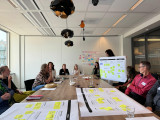Rising petrol and electricity prices; increasing digitalisation and declining public transport supply, among other things, are causing more and more people to have problems getting around. Sustainability and shared mobility do not seem to be for everyone, and measures to encourage them may even exacerbate the problem. This increases the risk of social exclusion.
The province of North Holland and DRIFT are concerned about mobility poverty and wonder what we can do about it to keep everyone in our society mobile. However, little is still known about the extent of the problem, the exact target groups and what instruments work (and what, above all, do not). We are therefore keen to engage with partners to reach a shared understanding and an aligned approach.
Since mid 2022, we have been working on this challenge with network partners in various working group sessions. Would you like to think along and be part of the solution? Contact me at pelle@amsterdamsmartcity.com.
Project phase
This project has led to the creation of a new coalition of concerned parties in the Amsterdam region. We're currently appointing a project leader, deciding of financing options, and organizing a manifest/signature meeting.
What is the goal of the project?
Broadly speaking, the goals of this project are; addressing the concept of Mobility Poverty among powerful organizations and policy makers, gaining a better understanding of the subject (geographically and experience wise), and finding ways to bridge the gap between citizens and policy.
What is the result of the project?
This challenge revolves around value for the public, as its aim is to increase access to our mobility system for those who experience a lack of. Continuation of research on this subject will amplify the struggles and needs of citizens regarding travel behavior, and it will help enforce links between citizen initiatives and policy makers.
In the spring of 2022, this topic was brought up during one of Amsterdam Smart City’s Demodays. Later that year, the Co-creation and Transition days were used to facilitate and continue discussions around everything related to Mobility Poverty. During those three sessions, Maxim Burlini and Chris de Veer from The Province of North-Holland, and Gijs Diercks and Emil Beemer from DRIFT presented the topic and their initial research results on this subject. Furthermore, they used the different parties at the table to gather input for follow-up questions for research, did some brainstorming on different policy instruments, and they got an idea of what’s already happening in terms of related projects in the region. These were also used to form a group of interested parties to take on the challenge in 2023.
In 2023, we facilitated a series of reccuring working sessions for our commited partners.
January: Presentations on; a research proposition by the Province of North-Holland and TNO, and a research proposition by DRIFT. Together with the attendees, we discussed an outline for a possible programme and manifest on this topic.
March: Presentations on the concept of 'Mobility Wallets' (Rebel) and digital payment integration/ OV Pay in the Netherlands (Province of North-Holland).
June: Presentation by Matthew Bruno (Vervoerregio Amsterdam) on his Mobility Poverty research, analysing policy documents on its inclusion of this topic. Furthermore, the working group discussed financing options, hiring a new project leader, and the first tasks for this new project team.
August: Presentations by Ideate on their Inclusive Shared Mobility report, made for I&W. This initiated discussions on the different stakeholders (Governments, target groups, public transport & shared mobility providers) and their specific needs. Furthermore, the Province of North-Holland confirmed they will apoint a project leader to push this initiative. The coming months we'll work towards a set of initiatives and tasks for the (re)launch of this project.
Who initiated the project and which organizations are involved?
The topic of Mobility Poverty was alarmed within the Amsterdam Smart City network by The Province of North-Holland and The Dutch Research Institute (DRIFT). A variety of parties have been contributing during the different working sessions. For example: The Municipality of Amsterdam, Vervoerregio Amsterdam, Rebel, The University of Applied Sciences Amsterdam, Overmorgen, Metropolitan Region of Amsterdam, Flevoland and Cenex NL
What is the next step?
After a period of slowing down, enriching, and forming new coalitions on this subject, it's time to take it to the next phase.
Amsterdam Smart City's aim is to transfer this initiative to the Province of North-Holland or a combination of governments at the start of 2024. A new project leader will be assigned and he/she will take over the directing role. Together with the committed parties, we'll shape the outlines of this new programme and assign concrete actions.





